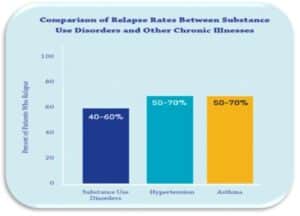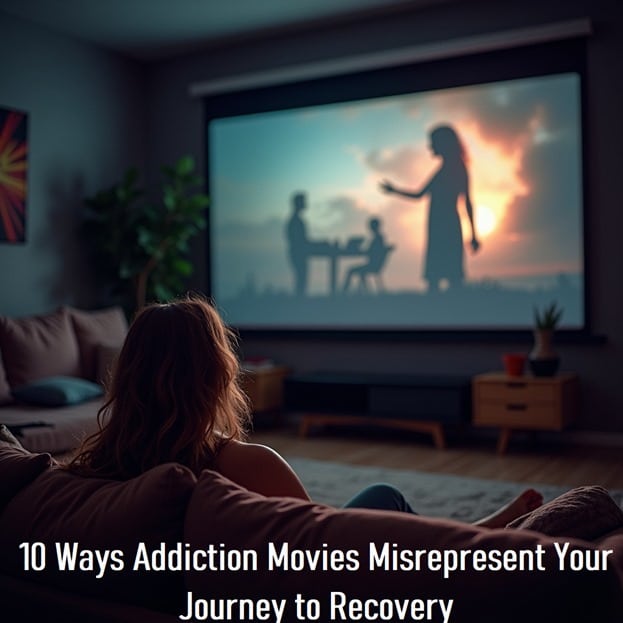Imagine you’re on your couch, eyes glued to the screen. You just watched a movie about addiction. The main character hits rock bottom but bounces back fast.
For you? Not so simple. You’ve battled addiction for years and feel lost.
Addiction movies love to gift-wrap this struggle. It looks so appealing. But the truth? Addiction is messy. Recovery is a wild ride.
Now, let’s face reality. Los Angeles is in an addiction crisis. Opioid misuse is skyrocketing. Overdose deaths are on the rise.
And homelessness? It’s getting worse, thanks to drugs. Sarah Hunter, director of the RAND Center on Housing and Homelessness in Los Angeles, says 50% of the homeless population struggles with addiction.
It highlights a harsh truth: many in LA face real barriers to recovery, which include a lack of affordable treatment and stigma.
Indeed, the journey is upsetting for those struggling with addiction. This post will explore the ways addiction movies misrepresent recovery and what it means for people living in it.
1. Recovery Isn’t Always a Straight Line
The problem is that movies make quitting look easy. The hero gets over it quickly. But in reality, recovery has its ups and downs.
Many face relapses and setbacks along the way. As stated by the National Institute on Drug Abuse (NIDA), 40-60% of individuals might slip back.

So, patience and strength are big deals in getting better.
2. Sober Living Is Not a Quick Fix
Just going to rehab doesn’t solve all your issues. Movies trim down the journey, and a short rehab stay doesn’t tell the whole story.
In real life, getting better takes time and support. Sober living spaces are big helpers. Studies show that these places make relapses less likely.
And real recovery requires you to keep trying and have a supportive environment.
3. Addiction Isn’t Just You Against the Whole World
Many movies often show addiction as a lone wolf’s fight. That’s not how it works. This portrayal is also misleading. The problem is that addiction hits families and friends, too.
According to a report by the Substance Abuse and Mental Health Services Administration (SAMHSA), having family in your corner boosts your chances of success.
So, everyone close to you should be part of your recovery journey.
4. Mind Matters Get Skipped
A significant issue in addiction movies is the neglect of co-occurring mental health disorders. They focus on the addiction, not what’s under it.
Studies show that about 50% of individuals with substance use disorders also experience mental health issues. Addressing both is essential for effective treatment.
Recognizing this duality can thus lead to more comprehensive treatment plans.
5. Therapy Is More Than Talking
Addiction movies often show therapy as a quick fix. But it’s a long haul in the real world.
The problem is that movies often depict therapy as a one-time conversation that resolves issues. In reality, therapy is a long-term commitment.
Research by the American Psychological Association shows that ongoing therapy helps recovery last.
Thus, long-term or sustained support is essential for meaningful change.
6. Recovery Isn’t Just a Solo Journey
Another issue is the portrayal of recovery as a solo endeavor. Movies may show a character’s journey without highlighting the community’s role. Supportive communities are vital in helping individuals stay motivated and accountable.
A good support crew keeps you moving forward. According to the National Institute on Alcohol Abuse and Alcoholism (NIAAA), support groups can be a lifeline during recovery.
So, a strong support network is crucial for sustained recovery.
7. Movies Make Using Drugs Look Cool
Movies often portray drug use in a fancy costume, making it look dreamy and setting us up for a letdown.

But the truth? It’s way more challenging. LA County Public Health says drugs fuel homelessness and crime. That’s the real picture, far from the movie magic.
This stark reality calls for more real talk about addiction on our screens.
8. Willpower Isn’t a Magic Wand for Addiction
Thinking that just being strong-minded beats addiction is a risky fairy tale. It’s like saying you can fix a broken leg by ignoring it. In other words, it oversimplifies a complex issue.
Beating addiction needs a complete toolkit: doctors, therapy, and a solid plan. NIDA tells us that evidence-based treatment approaches are the way forward.
Such an understanding can help us be gentler with those struggling with addiction.
9. A Slip-Up Doesn’t Mean Game Over
Addiction movies might paint a relapse as the ultimate failure. In reality, it’s often a step in the healing process. Knowing slip-ups are common can cut down the shame.
The Recovery Research Institute says many need a few tries before they make it.
Seeing relapse as part of the journey can help more people seek help.
10. Real Hope Isn’t a Movie Fade-Out
Movies love tidy endings. Life’s script? It’s not so simple. Recovery keeps rolling, needing daily work and grit.
Places like Haven House offer the steady ground for this marathon.
Thus, the real hero’s move is to keep the support network strong and steady.
The Impact of Haven House and Your Path to Recovery
Haven House is like a lifeboat for addiction fighters. They offer fancy, safe spots to get your life back on track. It’s a place where everyone understands your battle. That kind of backup is gold when you’re dodging recovery curveballs.
Places like Haven House fill a big old gap. They help stick the landing after rehab. Sure, addiction movies get us talking, but they twist the truth. Knowing these tall tales is crucial for families in the trenches.
The good news? Help is real. Spots like Haven House have the tools for a comeback. If you or someone you know is in the weeds, reach out! The right backup can turn “maybe” into “definitely” on recovery.

